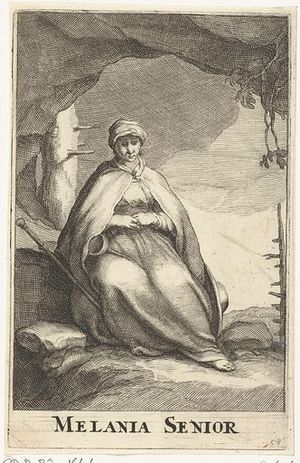Melania the Elder facts for kids
Quick facts for kids SaintMelania the Elder |
|
|---|---|
 |
|
| Born | ca. 350 Spain |
| Died | bef. 410 or ca. 417 Jerusalem |
| Venerated in | Eastern Orthodox Church Anglican Communion |
| Feast | June 8 |
Melania the Elder was an important Christian woman who lived a long time ago. She was born in Spain around the year 350. She passed away in Jerusalem around 410 or 417.
Melania was part of a group called the Desert Mothers. These were women who chose to live a simple, religious life. They often lived in deserts or quiet places. They wanted to focus on their faith. This movement grew after Emperor Constantine made Christianity a legal religion.
Melania was well-known to many famous people of her time. These included Abba Macarius and other Desert Fathers. She also knew Jerome, Augustine of Hippo, and Paulinus of Nola. She even founded two religious communities. These were on the Mount of Olives in Jerusalem.
She is remembered for starting a convent for women. She also started a monastery for men. This monastery was in honor of Rufinus of Aquileia. These were some of the first Christian communities. Melania believed in a simple, disciplined life. She thought it was very important for her faith.
Her Life Story
Melania the Elder was born in Hispania (which is now Spain). This was around 350 AD. Her family was very rich and powerful. Her father, Marcellinus, held a high position in the government. She was also related to Paulinus of Nola.
When she was just fourteen, Melania got married. She moved to the suburbs of Rome with her husband. Sadly, by the time she was twenty-two, her husband and two of her three sons had died.
After these sad events, Melania became a Christian. She decided to live a very religious life. She left her only remaining son, Valerius Publicola, with a guardian. Then, she traveled to Alexandria in Egypt. She went with her servants. Her goal was to visit the monks living in the desert at Nitria.
She stayed with these monks for about six months. This area is now called Wadi Natroun. Later, there was a time of trouble. Many monks were sent away from their homes. Melania followed them to Palestine. She helped them with her money.
The local governor even put her in prison for a short time. But he soon let her go. He realized she was a very important person. Melania then built a convent for women in Jerusalem. She also built a monastery for men. This monastery was for the monk and writer Rufinus of Aquileia.
Melania had some disagreements with other religious leaders. One famous writer, Jerome, sometimes spoke harshly about her. But another writer, Palladius of Galatia, called her "a very learned lady."
Around the year 400, Melania went back to Rome. She wanted to see her son. Her son had married a woman named Caeionia Albina. Melania had a big influence on her granddaughter. This granddaughter later became known as Melania the Younger. She also chose to live a religious life.
Melania also visited her relatives, Paulinus and Therasia. She brought Paulinus a special religious item. It was a piece of the True Cross. Augustine of Hippo wrote that Melania was in North Africa when her son died in 406.
Melania the Elder is considered a saint. Her special day, or feast day, is June 8.
Her Impact
Melania was a spiritual guide to Evagrius of Pontus. He wrote many important religious texts. She convinced him to go to Egypt. There, he joined the desert ascetics. They also wrote letters to each other.
See also
In Spanish: Melania la Vieja para niños
 | William M. Jackson |
 | Juan E. Gilbert |
 | Neil deGrasse Tyson |

